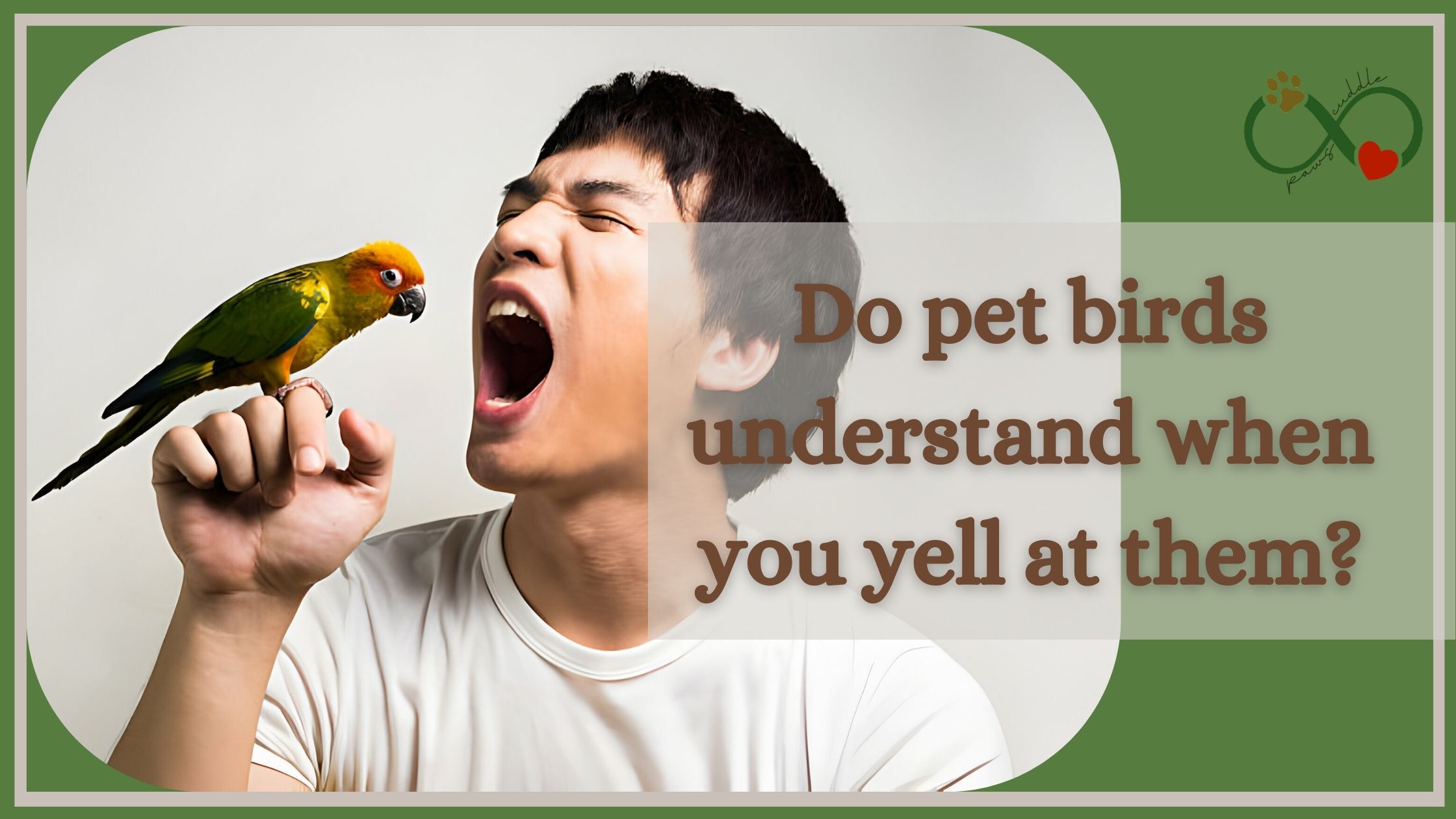Before reading my blog – Do pet birds understand when you yell at them?, consider the effects of human interactions with pet birds in this fascinating world of pet bird mental activity.
Remember that our feathery friends thrive in pleasant situations.
Use soft communication approaches and loving practices to develop a stronger bond with your pet bird.
With their beautiful plumage and charming personality, pet birds bring joy and friendship into numerous households.
As pet bird owners, we frequently worry about the level of communication with our feathery companions.
One often asked issue is if pet birds genuinely understand when we raise our voices in irritation or rage.
In this inquiry, we will look at the complexities of avian cognition and communication.
Do birds understand the intricacies of human emotions communicated via yelling?
To comprehend this, we must first recognize how birds see the environment.
Unlike humans, pet birds may not understand the complexities of language or the underlying causes of our emotions.
However, kids can intrinsically correlate sounds and behaviors with good or bad outcomes.
According to research, pet birds may learn to distinguish specific aural and visual signals from their owners.
These signals might include tone of voice, body language, and even particular words or phrases regularly utilized.
While pet birds may not understand the complicated emotions underlying shouting, they can detect bad energy and respond appropriately.
As responsible bird owners, we must be attentive to our creatures’ well-being.
How do we know if our feathery companions are in trouble or hurt?
Birds can show a variety of physical and behavioral indications, including silence, dullness, closed eyelids, fluffed feathers, apparent wounds, breathing problems, drooping wings, lameness, or difficulty standing.
Observing these indications encourages us to approach our dogs cautiously and, if necessary, look for expert veterinarian aid.
Aside from physical suffering, birds pet show remarkable sensitivity to human emotions.
They can detect when their owners are agitated, nervous, or depressed.
Birds may mimic similar sentiments, resulting in a reciprocal loop of shared sensations.
This sympathetic link emphasizes the strength of the tie between pet birds and their human partners.
When confronted with perceived dangers or disruptions, birds engage in protective behavior.
Angry vocalizations, frequently in a louder pitch and harsher tone, are used as a warning or protest.
Birds as pet may repeat these noises until the disruption stops.
A disturbed bird may also posture, which involves puffing up its feathers to seem more significant and violent.
Understanding these actions lets us read our dogs’ emotions and behave accordingly.
As a responsible and loving pet bird owner, I believe providing a good and nurturing atmosphere for our feathered companions is critical.
Yelling may not be an effective method of communicating withpet pet birds since they may need help understanding their reasons.
Instead, focus on polite communication, good encouragement, and learning your bird’s preferences and habits.
Finding yourself frustrated and raising your voice at your pet bird, wondering whether they understand your feelings?
so you will notice in my blog as we investigate if pet birds understand when we shout at them and what impact this may have on our bird pet.
Many pet owners worry if birds understand punishment.
The fact is that birds do not react well to physical punishment.
In fact, attempting to chastise them physically might cause a lack of trust and dread. Experts at vcahospitals.com recommend waiting until your bird is calm before attempting to handle them.
If your bird is aggressive, it is best to avoid trying to pick them up until they have calmed down.
Attempting to force engagement might result in bad associations, making it difficult to establish a healthy relationship with your bird pet.
When confronted with a wandering bird, the urge to reprimand or punish may emerge. However, experts recommend a different strategy.
Ignoring the misbehavior is usually more effective.
This clearly communicates to the bird that its activities are wrong. when i demonstrates my bird pet appropriate behavior, it is critical to reward them with attention and praise, resulting in a positive reinforcement loop.
The emotional bond between birds and their owners is quite astounding.
Birds have an extraordinary capacity to detect human emotions such as pity, grief, and worry.
If you react emotionally, your bird will most likely pick up on your sentiments, resulting in an emotional feedback cycle.
Parrots, known for their imitating ability, frequently leave us wondering if they genuinely understand what they say.
Experts agree that most parrots imitate without knowing the message.
They replicate a variety of sounds, from spoken words to domestic noises, but lack actual comprehension.
However, some properly taught parrots have shown remarkable capacity to understand and respond to particular phrases and orders.
while birds may not comprehend shouting in the same sense that people can, they are acutely aware of our emotions and reactions.
Positive reinforcement, patience, and understanding are essential for developing a deep and trustworthy friendship with your avian companion.
Rather than using harsh methods of discipline, focus on building a supportive environment that fosters good conduct.
Let us go on a journey of growing in our relationships with our feathery friends.
Investigate good communication techniques, spend quality time with your bird, and prioritize their health.
By providing a happy environment, you may foster a connection based on trust and friendship.
In conclusion, while pet birds may not completely understand the complexities of human emotions portrayed via shouting, they do detect bad energy and respond accordingly.
By being attentive of our communication and interpreting our birds’ signals, we may foster a pleasant and fulfilling connection with our feathered friends.
